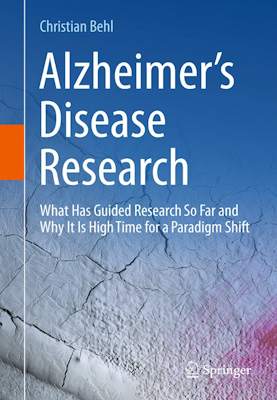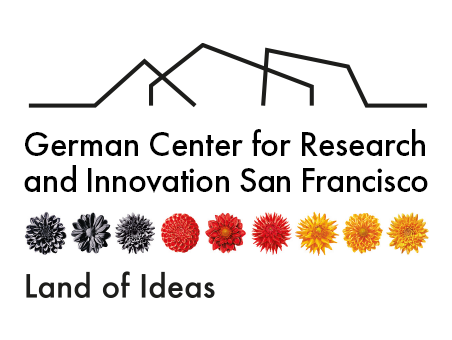Time for a Paradigm Shift: Rethinking Alzheimer’s Disease Research

DWIH San Francisco and the Henry Wheeler Center for Emerging and Neglected Diseases (CEND) at UC Berkeley are delighted to welcome Dr. Christian Behl, Professor at the University of Mainz to introduce his book. Following the introduction, there will be a moderated discussion with Dr. Julia Schaletzky, Executive Director of the Henry Wheeler Center for Emerging and Neglected Diseases (CEND) at UC Berkeley.
This event is free of charge and a reception will follow.
With approximately 6 million people living with Alzheimer’s disease in the United States, the need to develop an effective treatment is immense [1]. The U.S. government invests roughly $3.5 billion in Alzheimer’s research annually and funds research of Alzheimer’s disease-related dementias [2]. Despite potential treatments with anti-amyloid antibodies that “resulted in moderately less decline on measures of cognition and function,” and that are currently highly debated in the research field, especially regarding their clinical meaningfulness, a real breakthrough in Alzheimer’s therapy remains elusive [3].
 In his latest book, Alzheimer’s Disease Research: What Has Guided Research So Far and Why It Is High Time for a Paradigm Shift, neuroscientist Christian Behl outlines the development of Alzheimer’s research since the introduction of the label “Alzheimer’s disease”. Over the last three decades, research was dominated by the “amyloid-cascade-hypothesis,” which concludes that deposition of amyloid beta protein (AβP), the main component of brain plaques, causes Alzheimer’s and that the neurofibrillary tangles, cell loss, vascular damage, and dementia follow as a direct result of this deposition [4]. However, there are other promising research hypotheses, which have been hampered by the dominance of the purportedly crucial role of amyloid beta protein. From the work of the disease’s namesake Aloysius Alzheimer over 100 years ago to the most recent drug developments and controversies of the last decades, Behl tracks how much of the research has almost exclusively concentrated on the role of the amyloid-cascade-hypothesis and why this was the case. He notes Alzheimer’s disease as a complex and highly individual age-related brain disorder with a multifactorial background and an increasing amount of risk factors and risk genes. He argues that it is time to re-evaluate the amyloid-focus in dementia research and presents several alternative disease hypotheses. These hypotheses raise questions about Alzheimer’s disease research strategies, the funding landscape, and the sometimes too narrow focus on one dominating hypothesis. In his work, Behl calls for a widening of the Alzheimer’s research focus. [5]
In his latest book, Alzheimer’s Disease Research: What Has Guided Research So Far and Why It Is High Time for a Paradigm Shift, neuroscientist Christian Behl outlines the development of Alzheimer’s research since the introduction of the label “Alzheimer’s disease”. Over the last three decades, research was dominated by the “amyloid-cascade-hypothesis,” which concludes that deposition of amyloid beta protein (AβP), the main component of brain plaques, causes Alzheimer’s and that the neurofibrillary tangles, cell loss, vascular damage, and dementia follow as a direct result of this deposition [4]. However, there are other promising research hypotheses, which have been hampered by the dominance of the purportedly crucial role of amyloid beta protein. From the work of the disease’s namesake Aloysius Alzheimer over 100 years ago to the most recent drug developments and controversies of the last decades, Behl tracks how much of the research has almost exclusively concentrated on the role of the amyloid-cascade-hypothesis and why this was the case. He notes Alzheimer’s disease as a complex and highly individual age-related brain disorder with a multifactorial background and an increasing amount of risk factors and risk genes. He argues that it is time to re-evaluate the amyloid-focus in dementia research and presents several alternative disease hypotheses. These hypotheses raise questions about Alzheimer’s disease research strategies, the funding landscape, and the sometimes too narrow focus on one dominating hypothesis. In his work, Behl calls for a widening of the Alzheimer’s research focus. [5]
The discussion will address various topics surrounding Alzheimer’s disease research including the following questions:
- Why are the exact causes of Alzheimer’s disease still in the dark, despite the immense, global research efforts in academia as well as in the pharmaceutical industry? What is the current status of anti-amyloid therapy?
- Why has almost an entire research field primarily focused on a single hypothesis that establishes the deposition of the amyloid beta peptide in the brain as the key trigger of Alzheimer’s pathology, even though this concept has still not been convincingly proven in the clinics?
- Are there other hypotheses that might explain the pathogenesis of this complex brain disease, and if so, why were these perspectives not adequately followed?
Sources:
[1] National Institute on Aging. “Alzheimer’s Disease Fact Sheet.” National Institute on Aging, 5 Apr. 2023, www.nia.nih.gov/health/alzheimers-disease-fact-sheet/.
[2] National Institute of Health. “RePORT.” Report.nih.gov, 24 Feb. 2020, report.nih.gov/funding/categorical-spending#/.
[3] van Dyck CH, Swanson CJ, Aisen P, Bateman RJ, Chen C, Gee M, Kanekiyo M, Li D, Reyderman L, Cohen S, Froelich L, Katayama S, Sabbagh M, Vellas B, Watson D, Dhadda S, Irizarry M, Kramer LD, Iwatsubo T. Lecanemab in Early Alzheimer’s Disease. N Engl J Med. 2023 Jan 5;388(1):9-21. doi: 10.1056/NEJMoa2212948. Epub 2022 Nov 29. PMID: 36449413.
[4] Granzotto A, Sensi SL. Once upon a time, the Amyloid Cascade Hypothesis. Ageing Res Rev. 2024 Jan;93:102161. doi: 10.1016/j.arr.2023.102161. Epub 2023 Dec 6. PMID: 38065226.
[5] Christian Behl. Alzheimer’s Disease Research—What Has Guided Research So Far and Why It Is High Time for a Paradigm Shift, Springer Cham 2023; ISBN: 978-3-031-31570-1. doi.org/10.1007/978-3-031-31570-1
Speakers

Christian Behl is Professor of Pathobiochemistry and Director of the Institute of Pathobiochemistry at the University Medical Center of the Johannes Gutenberg University Mainz, Germany. He has been closely following Alzheimer’s Disease research since the early 1990’s, when he first got involved into the field himself during his time at the Salk Institute for Biological Studies, La Jolla, USA. He stayed active in the field all through his research station at the Max Planck Institute of Psychiatry, Munich, Germany, and later in Mainz. There his current research (in Mainz) focuses on the cellular degradation mechanism autophagy in the context of neurodegeneration and aging. For quite some time Behl has been an active advocate for widening the focus of Alzheimer’s Disease research to improve the understanding of this complex, age-related brain disorder. Behl is member of several scientific boards, including the German Alzheimer Foundation.Christian Behl

Julia Schaletzky joined UC Berkeley's Center for Emerging and Neglected Diseases in fall 2017 and is currently the center’s Executive Director. Originally from Germany, Julia trained as a Biochemist at Bayreuth University and completed her studies in the laboratory of Prof. Francis Barr at the Max-Planck-Institute of Biochemistry in Martinsried, Germany. She then went abroad to obtain her PhD in the laboratory of Prof. Tom Rapoport at Harvard Medical School/HHMI. While the main focus was on translocation of proteins across the endoplasmic reticulum membrane, she also volunteered as a mentor for the HHMI EXROP program, training and mentoring students from underrepresented communities over the summer. After completing her PhD, Julia joined Cytokinetics, a biotechnology company in South San Francisco. During her 11 years at Cytokinetics, Julia and her team focused on discovering and developing novel, first-in-class medicines against heart failure and neurodegenerative disorders such as ALS, which are currently in Phase III clinical trials. In addition, she took on several pro-bono projects stemming from academic collaborations, working after hours on successful screens against Trypanosomiasis (sleeping sickness), Malaria and Toxoplasmosis. Julia is passionate about treating neglected and emerging diseases, establishing effective collaboration between academia and industry and about translating basic science into new companies and ultimately cures. In her free time, Julia enjoys learning new skills, socializing with family and friends, and practicing the Arts.Julia Schaletzky
